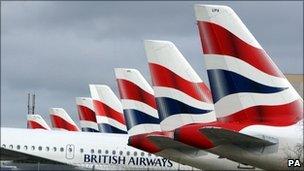British Airways reports £164m loss
- Published

BA cabin crew walked out for a total of 15 days in the quarter
British Airways has revealed a steep loss for the April-to-June quarter after being hit by cabin crew strikes and disruption caused by the volcanic ash cloud from Iceland.
BA reported a pre-tax loss of £164m, larger than the £148m loss it made in the same period last year.
BA said the impact of all the disruptions was £250m in the quarter, in line with previous estimates.
But it said total costs for the quarter were down 3.3% on a year ago.
Revenues at the airline were down 2.3%.
BA also said that the UK pensions regulator had approved its plan to reduce its pension deficit, which is central to BA's merger with Iberia.
The Spanish carrier now has until 30 September to review the plan. If it deems it unsatisfactory, it has the right to pull out of the merger.
Strike costs
The ash cloud from the Icelandic volcano caused airlines a headache in April, with UK airspace closed for six days as a result.
But the greatest impact on BA was caused by industrial action taken by staff.
BA cabin crew who are members of the Unite union have gone on strike for a total of 22 days so far this year, including 15 in the reported quarter.
The BBC's employment correspondent Martin Shankleman said the 15 days of strikes in May and June had cost the airline £142m.
That was on top of the losses incurred for the seven days of strikes in March, which BA had previously said cost between £6m and £7m a day.
That puts the overall costs of the strikes so far at between £184m and £191m.
'Steady recovery'
Despite the loss in the three months to June, BA maintained its forecast for the full year.
"While some economic experts are flagging the risk of a 'double dip' recession, the steady recovery continues and, on that basis, we continue to target to break even at a profit before tax level for the full year," chief executive Willie Walsh said.
BA said that its falling costs included a 0.7% reduction in fuel costs and a 4.3% drop in non-fuel costs.
As a result, the company's yields - the revenue it makes on each passenger for every mile travelled - rose 12.7%.
The airline highlighted a strong performance from its cargo business, which saw revenue jump 36.7%.
While passenger revenue fell 3.4%, BA said that without any disruption it would have increased by 11%.
'Reputational risk'
When the long-running dispute with cabin crew began, it was about changes to staffing levels, pay and working conditions.
However, the union says it now centres on the removal of travel perks from workers who went on strike and disciplinary action taken against some of those staff members, as well as how BA has handled industrial relations within the company.
Last week, Unite rejected BA's latest offer, raising the prospect of further industrial action.
Laurie Price, director of aviation strategy at Mott Macdonald, said the dispute was a "reputational risk" to the airline.
"People's memories are relatively short, and BA is not alone in having industrial disputes," he told the BBC.
"But for the short term, there is an issue. They have to get that cabin crew dispute out of the way."
Bookings impact
Unite joint leader Tony Woodley said: "I think it's the long-term damage which is perhaps more worrying than the current dispute. BA are driving down standards."
Talks are due to resume between the airline and the union on Monday, which will be held at the conciliation service Acas.
Bob Atkinson from the price comparison site travelsupermarket.com said the dispute was likely to affect bookings.
"Whilst demand always returns after disputes such as the one with Unite, it does particularly affect leisure passengers' attitudes, especially when they are booking often months in advance for their trips," he commented.
"BA must be suffering from customers voting with their holiday cash and booking with rival carriers."
Virgin's performance
Meanwhile, BA's long-haul rival Virgin Atlantic announced a pre-tax operating loss of £132m in the 12 months to February, but said business had been encouraging since then.
In the quarter from March to May, Virgin saw revenues rise 10%, helped by a 35% increase in cargo revenue and increased passenger numbers.
In particular, the airline increased its share of the Business Class market by 5% and also saw a 15% increase in Upper Class passengers.
"The start of the year has been encouraging despite difficult trading conditions. Demand is picking up across the majority of our routes and forward bookings for the summer have been very positive," said Steve Ridgway, chief executive of Virgin Atlantic.
The company also estimated that customer compensation and operational costs from the ash cloud disruption would total £30m.
- Published21 July 2010
- Published5 July 2010
- Published30 July 2010
- Published21 May 2010
- Published22 June 2010